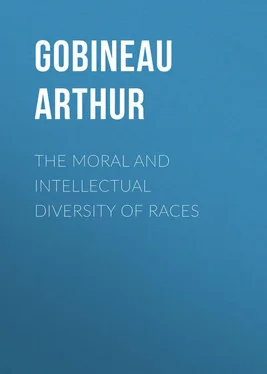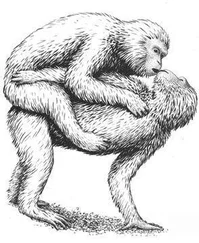Arthur Gobineau - The Moral and Intellectual Diversity of Races
Здесь есть возможность читать онлайн «Arthur Gobineau - The Moral and Intellectual Diversity of Races» — ознакомительный отрывок электронной книги совершенно бесплатно, а после прочтения отрывка купить полную версию. В некоторых случаях можно слушать аудио, скачать через торрент в формате fb2 и присутствует краткое содержание. Жанр: История, foreign_antique, foreign_prose, на английском языке. Описание произведения, (предисловие) а так же отзывы посетителей доступны на портале библиотеки ЛибКат.
- Название:The Moral and Intellectual Diversity of Races
- Автор:
- Жанр:
- Год:неизвестен
- ISBN:нет данных
- Рейтинг книги:4 / 5. Голосов: 1
-
Избранное:Добавить в избранное
- Отзывы:
-
Ваша оценка:
- 80
- 1
- 2
- 3
- 4
- 5
The Moral and Intellectual Diversity of Races: краткое содержание, описание и аннотация
Предлагаем к чтению аннотацию, описание, краткое содержание или предисловие (зависит от того, что написал сам автор книги «The Moral and Intellectual Diversity of Races»). Если вы не нашли необходимую информацию о книге — напишите в комментариях, мы постараемся отыскать её.
The Moral and Intellectual Diversity of Races — читать онлайн ознакомительный отрывок
Ниже представлен текст книги, разбитый по страницам. Система сохранения места последней прочитанной страницы, позволяет с удобством читать онлайн бесплатно книгу «The Moral and Intellectual Diversity of Races», без необходимости каждый раз заново искать на чём Вы остановились. Поставьте закладку, и сможете в любой момент перейти на страницу, на которой закончили чтение.
Интервал:
Закладка:
What is true of a society composed of individuals, is true of that vast political assemblage composed of nations. That each has a career to run through, a destiny to fulfil, is my firm and unwavering belief. That each must be gifted with peculiar qualities for that purpose, is a mere corollary of the proposition. This has been the opinion of all ages: "The men of Bœotia are noted for their stolidity, those of Attica for their wit." Common parlance proves that it is now, to-day, the opinion of all mankind, whatever theorists may say. Many affect to deride the idea of "manifest destiny" that possesses us Anglo-Americans, but who in the main doubts it? Who, that will but cast one glance on the map, or look back upon our history of yesterday only, can think of seriously denying that great purposes have been accomplished, will still be accomplished, and that these purposes were designed and guided by something more than blind chance? Unroll the page of history – of the great chain of human events, it is true, we perceive but few links; like eternity, its beginning is wrapt in darkness, its end a mystery above human comprehension – but, in the vast drama presented to us, in which nations form the cast, we see each play its part, then disappear. Some, as Mr. Gobineau has it, act the kings and rulers, others are content with inferior roles.
As it is incompatible with the wisdom of the Creator, to suppose that each nation was not specially fitted 16for the part assigned to it, we may judge of what they were capable of by what they have accomplished.
History, then, must be our guide; and never was epoch more propitious, for never has her lamp shone brighter. The study of this important science, which Niebuhr truly calls the magistra vitæ , has received within our days an impulse such as it never had before. The invaluable archæological treasures which the linguists and antiquarians of Europe have rescued from the literature and monuments of the great nations of former ages, bring – as it were – back to life again the mouldered generations of the dim past. We no longer content ourselves with chronological outlines, mere names, and unimportant accounts of kings and their quarrels; we seek to penetrate into the inner life of those multitudes who acted their part on the stage of history, and then disappeared, to understand the modes of thought, the feelings, ideas, instincts , which actuated them, and made them what they were. The hoary pyramids of the Nile valley are forced to divulge their age, the date of a former civilization; the temples and sepulchres, to furnish a minute account of even the private life of their builders; 17the arrow-headed characters on the disinterred bricks of the sites of Babylon and Nineveh, are no longer a secret to the indefatigable orientalists; the classic writers of Hindostan and China find their most zealous scholiasts, and profoundest critics, in the capitals of Western Europe. The dross of childish fables, which age after age has transmitted to its successor under the name of history, is exposed to the powerful furnace of reason and criticism, and the pure ore extracted, by such men as Niebuhr, Heeren, Ranke, Gibbon, Grote. The enthusiastic lover of ancient Rome now sees her early history in clearer, truer colors than did her own historians.
But, if history is indispensable to ethnology, the latter is no less so to a true understanding of history. The two sciences mutually shed light on one another's path, and though one of them is as yet in its infancy, its wonderful progress in so short a time, and the almost unparalleled attention which it has excited at all hands, are bright omens for the future. It will be obvious that, by ethnology , we do not mean ethnography , with which it has long been synonymous. Their meaning differs in the same manner, they bear almost the same relation to one another as geology and geography . While ethnography contents herself with the mere description and classification of the races of man, ethnology, to borrow the expressive language of the editor of the London Ethnological Journal , "investigates the mental and physical differences of mankind, and the organic laws upon which they depend; seeks to deduce from these investigations principles of human guidance, in all the important relations of social and national existence." 18The importance of this study cannot be better expressed than in the words of a writer in the North British Review for August, 1849: "No one that has not worked much in the element of history, can be aware of the immense importance of clearly keeping in view the differences of race that are discernible among the nations that inhabit different parts of the world… In speculative history, in questions relating to the past career and the future destinies of nations, it is only by a firm and efficient handling of this conception of our species, as broken up into so many groups or masses, physiologically different to a certain extent, that any progress can be made, or any available conclusions accurately arrived at ." 19
But in attempting to divide mankind into such groups, an ethnologist is met by a serious and apparently insurmountable difficulty. The gradation of color is so imperceptible from the clearest white to the jettest black; and even anatomical peculiarities, normal in one branch, are found to exist, albeit in exceptional cases, in many others; so that the ethnographers scarce know where to stop in their classification, and while some recognize but three grand varieties, others contend for five, for eleven, or even for a much greater number. This difficulty arises, in my estimation, mainly from the attempt to class mankind into different species, that is, groups who have a separate origin; and also, from the proneness to draw deductions from individual instances, by which almost any absurdity can be sustained, or truth refuted. As we have already inveighed against the latter error, and shall therefore try to avoid falling into it; and as we have no desire to enter the field of discussion about unity or plurality of species, we hope, in a great measure, to obviate the difficulties that beset the path of so many inquirers. By the word race 20we mean, both here and in the body of the work, such branches of the human family as are distinguished in the aggregate by certain well-defined physical or mental peculiarities, independent of the question whether they be of identical or diverse origin. For the sake of simplicity, these races are arranged in several principal classes, according to their relative affinities and resemblances. The most popular system of arrangement is that of Blumenbach, who recognizes five grand divisions, distinguished by appellations descriptive either of color or geographical position, viz: the White, Circassian, or European; the Yellow, Altaic, Asiatic, or Mongolian; the Red, American, or Indian; the Brown, or Malay; and, lastly, the Black, African, or negro. This division, though the most commonly adopted, has no superior claims above any other. Not only are its designations liable to very serious objections, but it is, in itself, entirely arbitrary. The Hottentot differs as much from the negro as the latter does from the Malay; and the Polynesian from the Malay more than the American from the Mongolian. Upon the same principle, then, the number of classes might be indefinitely extended. Mr. Gobineau thought three classes sufficient to answer every purpose, and these he calls respectively the white, yellow, and black. Mr. Latham, 21the great ethnographer, adopts a system almost precisely similar to our author's, and upon grounds entirely different. Though, for my own part, I should prefer a greater number of primary divisions, I confess that this coincidence of opinion in two men, pursuing, independent of, and unknown to each other, different paths of investigation, is a strong evidence of the correctness of their system, which, moreover, has the merit of great simplicity and clearness.
Читать дальшеИнтервал:
Закладка:
Похожие книги на «The Moral and Intellectual Diversity of Races»
Представляем Вашему вниманию похожие книги на «The Moral and Intellectual Diversity of Races» списком для выбора. Мы отобрали схожую по названию и смыслу литературу в надежде предоставить читателям больше вариантов отыскать новые, интересные, ещё непрочитанные произведения.
Обсуждение, отзывы о книге «The Moral and Intellectual Diversity of Races» и просто собственные мнения читателей. Оставьте ваши комментарии, напишите, что Вы думаете о произведении, его смысле или главных героях. Укажите что конкретно понравилось, а что нет, и почему Вы так считаете.












